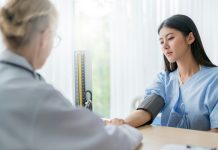
A study by Kaiser Permanente researchers has revealed that measuring blood pressure at home provides more accurate results than clinic-based readings.
This finding has significant implications for diagnosing and managing high blood pressure.
The study involved 510 adults at high risk of hypertension, visiting 12 Kaiser Permanente primary care centers in Western Washington between 2017 and 2019.
Participants were divided into three groups for follow-up blood pressure measurements: in-clinic, at-home, or at kiosks in medical clinics or pharmacies.
All participants underwent 24-hour ambulatory blood pressure monitoring (ABPM), considered the gold standard for diagnosing high blood pressure.
Home blood pressure readings aligned more closely with ABPM results, while clinic readings often showed lower systolic values, leading to missed hypertension diagnoses in over half the cases.
Blood pressure measurements from kiosks were generally higher than ABPM, raising concerns of overdiagnosing hypertension.
Importance of Accurate Blood Pressure Measurement
Accurate diagnosis of high blood pressure is crucial, as it can lead to serious health issues like heart attacks, strokes, and kidney damage.
Current guidelines recommend confirming high clinic blood pressure readings with ABPM or home monitoring before making a diagnosis. However, many healthcare providers still rely on clinic measurements for the second reading.
A companion study found that patients preferred taking their blood pressure at home.
The Kaiser Permanente study is particularly impactful due to its large participant pool, involvement of primary care clinics, and use of real-world practitioners instead of research personnel for blood pressure measurements.
Conclusion
This research presents strong evidence supporting home blood pressure monitoring as a more accurate method than clinic-based measurements for diagnosing high blood pressure.
It highlights the need for healthcare providers to adapt their practices in line with current guidelines to ensure accurate diagnosis and effective management of hypertension.
The study, led by Dr. Beverly B. Green and published in the Journal of General Internal Medicine, marks a significant step in improving hypertension care by emphasizing the reliability and preference of home-based blood pressure monitoring.
If you care about high blood pressure, please read studies about unhealthy habits that may increase high blood pressure risk, and drinking green tea could help lower blood pressure.
For more information about high blood pressure, please see recent studies about what to eat or to avoid for high blood pressure, and 12 foods that lower blood pressure.
Copyright © 2023 Knowridge Science Report. All rights reserved.



